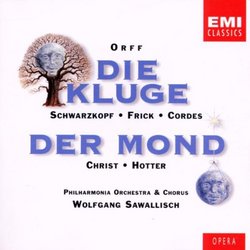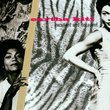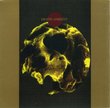| All Artists: Carl Orff, Wolfgang Sawallisch Title: Orff: Die Kluge / Der Mond Members Wishing: 1 Total Copies: 0 Label: EMI DRM Release Date: 11/5/2002 Album Type: Import Genre: Classical Styles: Opera & Classical Vocal, Historical Periods, Modern, 20th, & 21st Century Number of Discs: 2 SwapaCD Credits: 2 UPC: 077776371221 |
Search - Carl Orff, Wolfgang Sawallisch :: Orff: Die Kluge / Der Mond
 | Carl Orff, Wolfgang Sawallisch Orff: Die Kluge / Der Mond Genre: Classical
|
Larger Image |
CD DetailsSimilar CDs
|
CD ReviewsOrff - More than Just Carmina Burana Christopher Forbes | Brooklyn,, NY | 05/31/2003 (5 out of 5 stars) "Carmina Burana is Karl Orff's Pyrric victory. Its tremendous success, particularly in the USA, has consigned his other work to obscurity. But Orff is much more than the composer of one great popular piece of music and children's music. Orff had an original operatic vision and a theatrical gift that is inexplicably forgotten today. This is hard to understand, given the two thoroughly enjoyable works on this CD. Orff was interested in creating what he called "theater of the world", a form that was related to Jungian mythological concepts, oriental and Greek theater, and ultimately, an alternative vision of the Gesamkunstwerke of Wagner. Both of these works date from the war years, and yet they are blessedly free of the ideological messes of the times. Both works are allegorical fairytales, presented with high spirited humor and ribaldry. As such they are the direct descendents of Carmina Burana. Die Kluge is based on the story of the Clever Young Woman and the King from the Brothers Grimm. A young woman, the daughter of a farmer, impresses a king with her wit and cleverness and becomes his wife. In this position she uses her wiles to correct even the king's own injustices. Der Mond is even more archetypal. Four young men who live in a land of perpetual night trick a neighboring village out of the Moon, thereby bringing light to their world. When the men die, they are buried with a quarter of the moon each. In the underworld, they reassemble the moon and wake the dead, who begin partying up a storm. This in turn brings St. Peter down from heaven. He joins the dead in their debaucheries, until they are exhausted and fall back to sleep. Then, releasing the dead from both joy and torment, and giving them the blessing of perpetual rest, St. Peter returns to heaven with the Moon, which he places in the sky for all. A child spots the moon and all people on earth stare in wonder. Both or Orff's works here are in a delightful theatrical style. The work owes a debt to German singspiel, with it's spoken dialogue and bawdy songs, to medieval drinking songs, to elements of world mythos, music and culture, and to popular medieval entertainments. But under the surface ribaldry, both works are deeply moving and spiritual. Musically, Orff's melodic gifts are at the fore. Though many of the numbers feature colorful percussion and driving rhythms, the voices are clearly at the fore in the work, just as they are in Carmina. And in the midst of the most bawdy moments, particularly in Der Mond, there are moments of great beauty and tenderness. The melodic and harmonic idioms are fresh and tonal in the manner of Carmina. Orff's later operas took a turn for the serious after these works. Antigone, Oedipus and Prometheus become much more archaic in sound, and by Orff's final opera, Die Temporum Fine Comedia, his mythos had expanded enough to include visions of the end of time. But these early operas, though related, are much more life-affirming and joyous than later Orff pieces. For anyone out there looking for "something like Carmina Burana" these works are highly recommended. They partake of that work's strengths, while showing a greater sense of craft and art. Highly recommended!" Two one act charmers Ted Zoldan | Los Angeles, CA, USA | 08/02/2006 (5 out of 5 stars) "Carl Orff became famous for his cantata Camina Burana, but it is a shame these operas are not better known. Die Kluge and Der Mond are far from Orff's best work, but both are intriguing, interesting, and enjoyable operatic adventures. These two Märchenoperin (Fairy Tale Operas), as Orff called them,were recorded by Wolfgang Sawallisch two years apart (in 1956 and 1958), and the recently-retired conductor gives a sensitive, unmannered and refreshing reading of the scores. Over half of DIE KLUGE (The wise woman) is either syncopated singing or is spoken in rhythm, and requires a cast of superb singer-actors, and Sawallish and Walter Legge, the recording's producer, gathered a well-nigh perfect cast. Elisabeth Schwarzkopf sings the title role in uncharacteriscly good voice, with great purity of tone and a non-operatic sound that fits the simplicity of the character. She does perhaps her best work in he near-a cappella lullaby, "Shuhschuhu, es fallen dem Konig die Augen zu", sung in a way that would put even the most cranky baby (or King) to sleep. g Schwarzkopf's is the only role requiring real lyrical singing, the other members of the cast provide more than adequate in their dialogue-heavy roles. The only other real principle, the King, is sung by baritone Marcel Cordes, who plays the monarch's anger and pride very well in both music and dialogue, making the king's major outburst at his wife harrowing. Uberbass Gottlob Frick gives a fine cameo as the peseant and his five-minute lament at the beginning of the opera lets him show more care for the words than he usually does. Rudolf Christ makes a fine Donkey Man, proving apt in not only the more rhythmic passages and the dialogue, but also in the lyrical singing Scene six calls for. And in the important roles of the three Vagabonds, roles requiring true singer-actors as over half of the roles are spoken, Legge out did himself: We have a famous Mime (Paul Kuén), a famous Alberich (Gustav Niedlinger), and a baritone who would soon become a bonafide star (Hermann Prey). They are superb in the spoken scenes, and their rousing drinking song is a highlight of the set. Oh, and the voice who announces the Opera at the beginning: That's Carl Orff himself, who was present during the recording sessions I would never hope to hear a better performance of this opera.. Der Mond is a different matter. Not that this recording is bad, it's very, very good, but I feel something is missing in Sawallish's careful handling of the score, or perhaps it was because Orff was not there to oversee the performance. There's just not enough boisterous energy in Sawallisch's handling of the score, though the slower passages are more effective, especially those sung by the narrator. That is in no small part thanks to the contribution of Rudolf Christ, one of two returning singers from Die Kluge, who copes unbelievably well with the part's extremely high Tessitura and carries a beautiful line far above the staff, a rare feat for a lyric tenor. Hans Hotter also provides an amazing contribution as St. Peter. He is in fine voice, not letting his ever-present wobble to destroy his performance. One of the great singing actors of his days, Hotter projects just the right mix of gravity and sense of fun into this jovival saint, and I wouldn't expect anything less from him. We even get to her his majestic speaking voice. In the only other important singing roles, those of the four fellows who steal the moon, Karl Schmidtt-Walter, Helmut Graml, Paul Kuén (The other returning Kluge singer), and Peter Lagger, provide the same sense of fun to the hail-fellow well-met rouges at the center of this opera as Kuén, Prey and Neidlinger did to the three Vagabonds in Die Kluge, and they sound fantastic when they throw their voices together. Schmidtt-Walter (a famous Papagano of his day) has the most to do, and sings his dying speech most winningly. And as to the all important chorus in Der Mond, as residents of the living world and of the dead one, I can give no higher praise to the Philharmonia Chorus and chorus master Wilhelm Pitz. They sound fantastic. The standard Operatic repitoire can only hold so many operas, gand I would never give either of these works precedent over any of the major works to have emerged in the 20th century. But these are two fine works, and by no means should be neglected to the trash heap that befell so many operas. And in any case, even if these were mediocre works, the sheer quality of these recordings would shine through even in a work lesser than these. 5/5 EDITOR'S NOTE: This review was written the day before Ms. Schwarzkopf passed away, and Die Kluge will always remain in my head when I think of this great artist. " A Must Have Tomislav Mihalic | Zagreb, Croatia | 09/19/2005 (5 out of 5 stars) "Many people think Carmina Burana whenever they hear the name of Carl Orff. When I hear that name, I think of Die Kluge/Der Mond, because that was what I listened to when I was 4-5 years of age. My dad had a huge collection of vinyl classic records. Today I'm 48. To this day, Die Kluge/Der Mond has remained one of my favorite classics. This particular performance I was seeking for decades. If you like Orff, get this one. You'll feel a child again."
|

 Track Listings (21) - Disc #1
Track Listings (21) - Disc #1


